⚠️ Did you get an email claiming “I gained control of your devices, thanks to your predilection for porn sites” with threats about sharing your private activities? This is a scam known as “Sextortion“.
What the email says: It claims that the scammer has accessed your devices by exploiting your visits to certain websites. They say they can see everything that happens on your screen and have taken screenshots of you. They threaten to share these images and videos on social media and send them to your contacts unless you pay them in Bitcoin.
But here’s the truth: These frightening claims are false. The scammers are just trying to scare you into sending them money without having any real footage or evidence.
Here’s an example of the “I gained control of your devices” email scam:
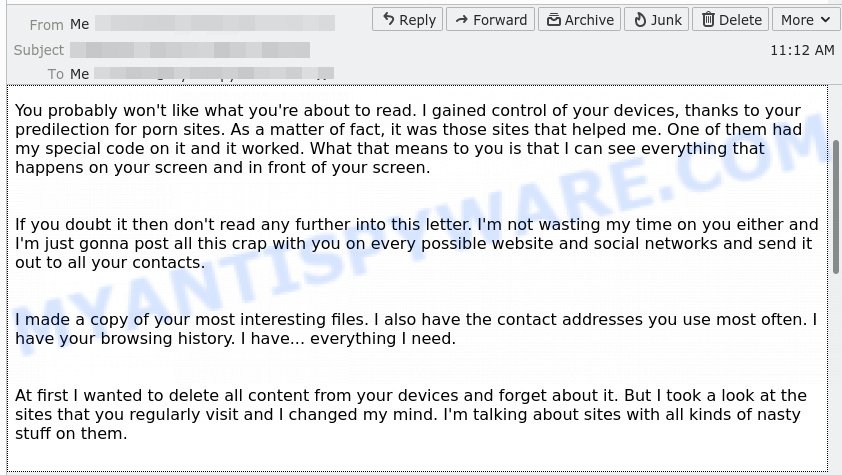
The “I gained control of your devices Email Scam” uses fear to manipulate people. Remember, paying these scammers doesn’t protect you; it just makes you a target for further scams. Always be skeptical of emails that demand money or personal information. Keep your computer security robust and stay cautious. Being aware of these scams and vigilant is your best defense online.
Table of Contents
Is this a scam email?
Yes, the email that starts with a strange sequence of numbers and letters and then describes gaining control of your devices due to your use of adult websites is a scam. 🚫 If you received an email threatening to release private videos or information unless you pay a fee, proceed with caution. These claims are false and designed to frighten you into sending money unnecessarily.
Here’s what the scam email might say:
- I installed a special code on the adult sites you visited and now I can see everything on your screen.
- I’ve taken screenshots of you and the websites you visit, and I’ll send them to everyone you know if you don’t pay me.
- You must send $699 USD in Bitcoin to my wallet to prevent me from spreading these images.
- Don’t bother going to the police or tampering with your devices, or I’ll start sharing the content immediately.
- I sent this from an email address that can’t be traced back to me, so don’t reply.
The email relies on intimidation and threats to coerce you into acting hastily and fearfully. 🚨 The real goal? To deceive you into sending money without any legitimate evidence that the claimed videos exist. These scammers exploit your fear of public embarrassment or panic to manipulate you.
🚩 Signs This Email Is a Scam:
Stay vigilant and skeptical about such emails if you notice these indicators. 🔍🛡️
- 📧 Frightening Messages: Emails that threaten to expose embarrassing details about you.
- 🔗 Requests for Bitcoin: The scammer demands payment in Bitcoin, capitalizing on its anonymity.
- ⏳ Urgency to Respond: The email sets a tight deadline to pressure you into making a decision quickly out of fear.
- 🖼️ Claims of Malware: Be wary of emails claiming they’ve infected your devices with advanced malware without showing any proof.
- ✍️ Threatening Language: These emails typically include explicit threats to distribute private info among your contacts.
- 👤 Anonymous Sender: The scammer often uses a disposable or hidden email address to remain anonymous.
- 🔄 Lack of Concrete Evidence: If the claims were genuine, there would likely be some evidence presented, but scammers rely solely on threats without substantiation.
Understanding the ‘I gained control of your devices’ Email Scam
If you receive an email that says “I gained control of your devices“, it’s normal to be alarmed 🚨. These emails typically start with frightening statements to grab your attention immediately. You might think, “How could they access my devices?” In reality, the sender likely doesn’t have any access to your personal information; their goal is to intimidate you into acting hastily.
These emails include baseless threats, claiming they have videos or other compromising information that could humiliate you 🎥. The wording is intentionally vague and menacing, crafted to make you feel uneasy: “Could any of this actually be true?”
The scammer may claim they’ve installed sophisticated malware, like spyware, on your device, purporting to have the ability to monitor all your online activities 💻. A clear sign this is a scam is the lack of any concrete evidence 🚩. They use the threat of high-tech surveillance to frighten you, not genuine hacking abilities.
The email typically concludes with a request for a payment 💰, with the scammer demanding a ransom in Bitcoin because it’s difficult to track. The scam is orchestrated to coerce you into paying swiftly. However, making a payment doesn’t guarantee your safety and may even mark you for further scams.
Upon reading the email, you might question, “Am I truly in danger?” or “Can this individual actually do what they claim?“. Generally, these threats are fictitious; they are merely exploiting your fears.
What should you do? It’s advisable not to respond to the scammer or send any money. Concentrate on securing your online presence: update your passwords, ensure your devices are protected, and consider reporting to the police if the scam involves threats or extortion 🔐. Such incidents underscore the importance of vigilance and proactive online security measures.
The email read as follows:
Hi,
> 2b42c272f2e2d2f2386a626e6f4f79727e7c612c3c353f6a636a746164686095e6f6f2c4c7e7d302022332427138747774
You probably won’t like what you’re about to read. I gained control of your devices, thanks to your predilection for porn sites. As a matter of fact, it was those sites that helped me. One of them had my special code on it and it worked. What that means to you is that I can see everything that happens on your screen and in front of your screen.
If you doubt it then don’t read any further into this letter. I’m not wasting my time on you either and I’m just gonna post all this crap with you on every possible website and social networks and send it out to all your contacts.
I made a copy of your most interesting files. I also have the contact addresses you use most often. I have your browsing history. I have… everything I need.
At first I wanted to delete all content from your devices and forget about it. But I took a look at the sites that you regularly visit and I changed my mind. I’m talking about sites with all kinds of nasty stuff on them.
After a while, I had an idea. I took screenshots of website pages where you spend your time alone. Then I took screenshots of you satisfying yourself using the camera of one of your devices. ( By the way, I had to wait for you to successfully to get in the camera lens.) But it was worth it and it will impress to all your acquaintances and regular people on the Internet.
To cut a long story short I’ll make you a deal. You wire me the money and I’ll delete all that shit about you and we’ll forget about each other.
$699 USD is fine with me. Although at first I wanted a larger amount.
Pay only in BTC to wallet: 1My19bMiRYkm5HxgrjN48TR1SvVQq1CLs6
I’ll give you two days from now to pay. I told you what happens if you don’t pay, I don’t give a fuck, it’s up to you. And don’t hold a grudge. Everybody’s got a job to do.
And one more thing:
Learn to lock your windows.. and why are you making that funny face?)
Essentially, this scam relies on instilling fear and urgency to deceive you. If you receive an email like this, do not engage with the scammer or transfer any money. Simply delete the email. Also, keep your computer safeguarded with up-to-date anti-virus software, and use strong, unique passwords for all your accounts to help prevent falling victim to such scams.
Examples of such scams
Scammers have developed a variety of tactics to intimidate and exploit unsuspecting individuals. Here are a few common examples:
🔒 Your Private Information has been Stolen Email Scam
Here, the scammer will claim they’ve stolen sensitive information from you and threaten to release it unless you pay a ransom. They rely on the scare factor, hoping you’ll pay to protect your reputation, even though they likely have no data at all.
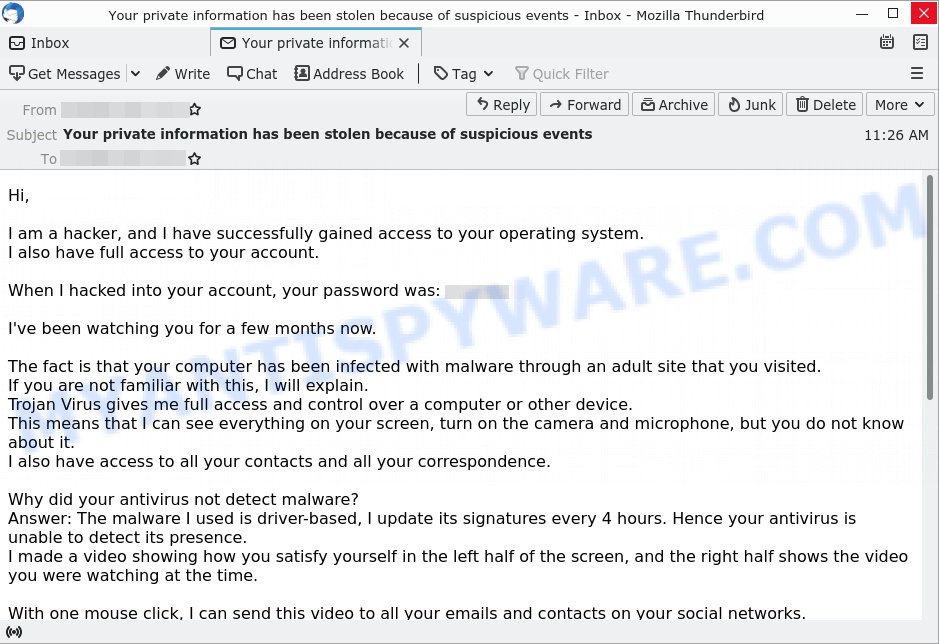
📹 I RECORDED YOU Email Scam
In this scam, the sender claims to have control over your camera and alleges they have recorded you during private moments. They typically demand payment to keep the footage private. Beware: this is a bluff to get you to pay up out of fear.
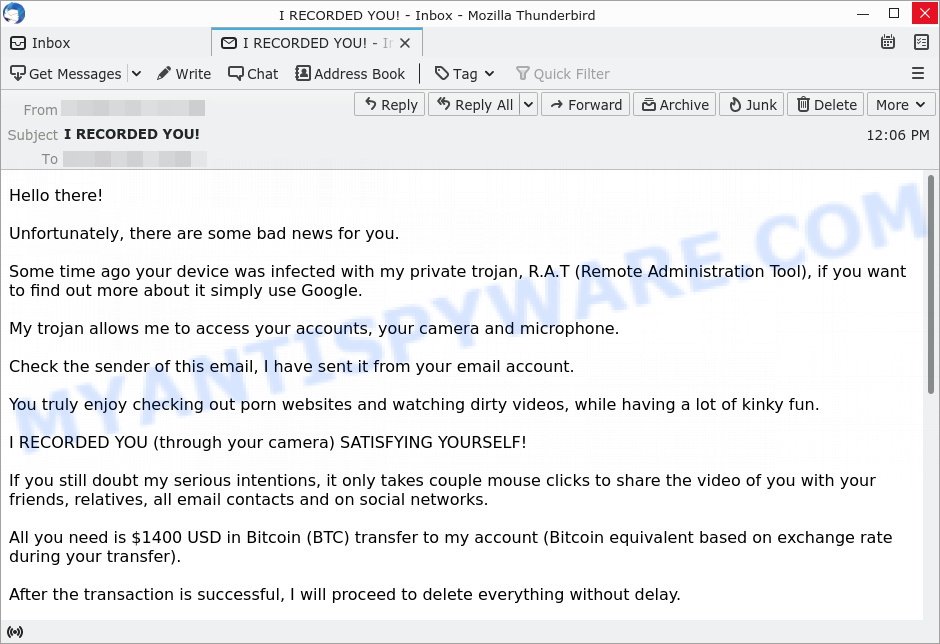
💼 I am a professional hacker EMAIL SCAM
Posing as a hacker, the sender of this email might say they’ve infiltrated your system. They may even claim they have proof of embarrassing activity and will publish it unless you send them money. Remember, a real hacker wouldn’t announce their presence—it’s a tactic to pressure you into paying.
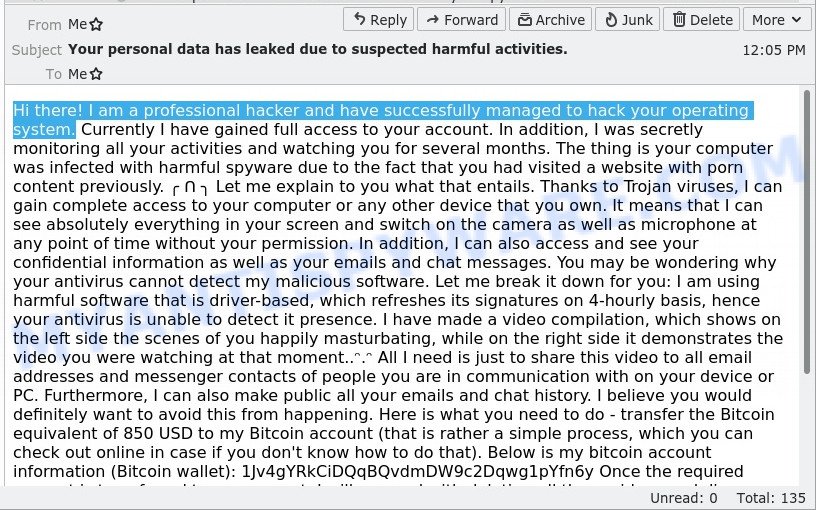
Each of these scams plays on fear and urgency to trick you into acting against your best interest. Always approach such emails with skepticism, verify your security, and do not engage with the scammers.
Should you send the money?
No, don’t give the scammer any money. It’s a scam, and giving them money will only encourage them to continue their criminal activities. Plus, if you pay once, they might target you again. To keep your personal information safe, always use strong and unique passwords for each of your accounts, enable two-factor authentication for an extra layer of security, and keep your computer’s antivirus software up to date. If you receive an email like this, it’s important to report it to the authorities and your email provider.
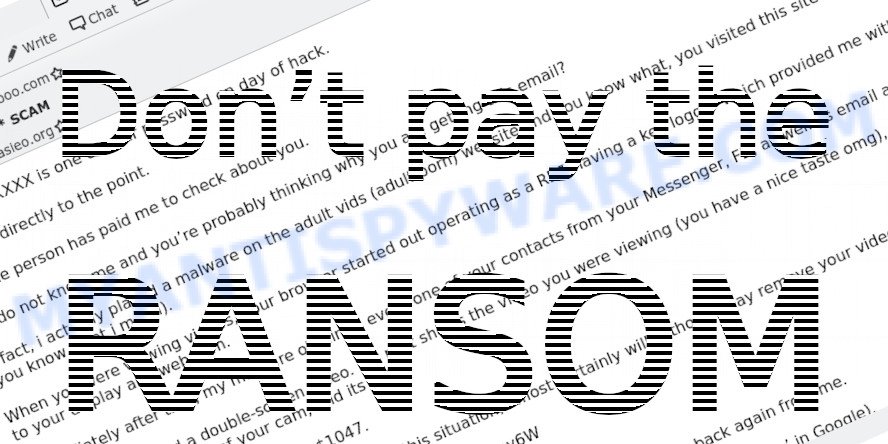
What to Do if You Receive the Email
Getting an email that says someone has control over your devices because you visited certain websites can be scary, but there are safe and calm ways to deal with it.

Here’s a specific guide on handling this scam:
Begin by reminding yourself to stay calm. The email is crafted to elicit panic, pushing recipients into rash decisions. Recognize its true nature—a manipulative attempt to exploit fear.
Resist any impulses to pay. Even if you’re tempted to make the problem go away, understand that payment doesn’t guarantee safety. It merely emboldens the scammer, possibly marking you as an easy target for future deceptions.
Do not engage with the scammer. Replying or trying to open a dialogue can inadvertently give away more information, or signal that your email is active, making you a prime candidate for further scams.
Seeing a familiar password can be particularly jarring. If the scam email mentions a password you recognize, it’s essential to check its source. Use services like haveibeenpwned.com to see if your email or credentials have been compromised in any past data breaches.
Subsequent to that, update your passwords. Always choose strong, unique combinations and activate two-factor authentication on platforms that support it.
As a precaution, run a comprehensive security scan on your device. While the scam email’s claims about malware are usually baseless, this step ensures your system remains clean and threat-free.
Report the email to relevant authorities (e.g., FTC). Sharing details with your local law enforcement or cybercrime units can contribute to ongoing investigations and aid in the crackdown on such malicious activities.
Lastly, spread awareness. Inform friends, colleagues, and family about the scam, equipping them with the knowledge to recognize and sidestep such threats. Knowledge, shared and acted upon, diminishes the effectiveness of these scams, making the digital world a bit safer for everyone.
Threat Summary
| Name | ‘I gained control of your devices’ Email Scam |
| Type | Phishing/Sextortion |
| Ransom amount | $699 USD (in Bitcoin equivalent) |
| Bitcoin Address | 1My19bMiRYkm5HxgrjN48TR1SvVQq1CLs6 |
| Fake Claims | Access to personal data and browsing history, control over webcam, possession of embarrassing photos and videos |
| Damage | Psychological distress, potential financial loss if ransom is paid |
| Distribution | Mass emailing, likely from a purchased or hacked email list |
| Tactics | Inducing fear, creating urgency, deceptive claims |
| Variations | Different ransom amounts, varying email content, alternative cryptocurrencies for payment |
| Prevention Tips | Use strong, unique passwords; enable two-factor authentication; be skeptical of unsolicited emails; never pay ransoms |
| Reporting Info | Forward to the Anti-Phishing Working Group at reportphishing@apwg.org; Report the scam to relevant authorities (e.g., FTC); Share information about the scam with friends and family to raise awareness; Monitor online accounts for any suspicious activity |
Conclusion
The “I gained control of your devices” email is a typical sextortion scam that uses fear to try to get money from you. The scammer claims they’ve taken over your devices by infecting them through adult websites and threatens to share supposed recordings of you in private moments unless you pay a ransom in Bitcoin. Remember, these threats are almost always fake, designed to scare you into paying.
Bottom Line: Ignore these emails. The best way to protect yourself is to not engage with the sender and to upgrade your device security. 🛡️💻
Stay sharp and think critically; an email that triggers fear or seems overly complex is probably a scam. 🤔
















